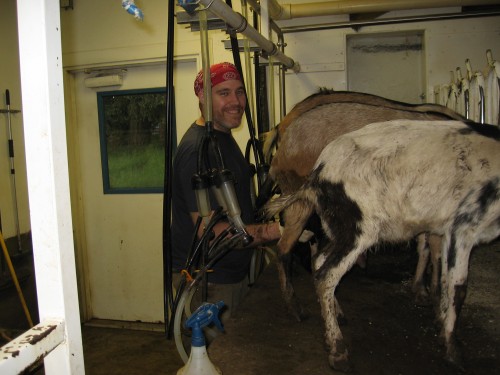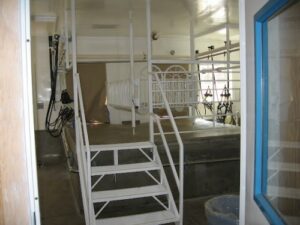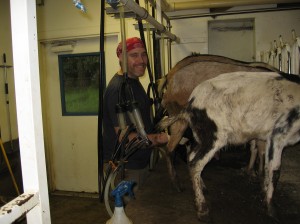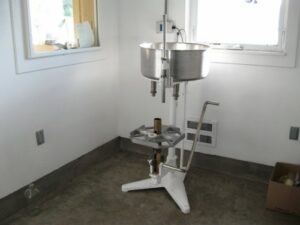
Becoming an artisan cheesemaker was a choice, and a dream. It wasn’t a line of work bestowed upon me by being a part of a dairying family. In October of 2008, my girlfriend at the time convinced me (which admittedly wasn’t that difficult), that we should leave our office jobs in the Bay Area of California and pick up to find something new. On December 26th we loaded up my little Saturn coupe and headed north along the coast for a road trip, final destination unknown. About a month and a half in, discussing our aspirations around the campfire, we decided that goat dairying was what we wanted to do.
We were somewhere on the scenic Oregon coast. I got online and Googled for goat dairies on the west coast. I followed a link to the Oregon Cheese Guild which led me to Ferns’ Edge Goat Dairy in Lowell, OR. I sent out an email to Shari Reyna, with whom we met within the week. She happened to have positions available, and so began our new country life.

After working last in an office and having a relaxing two month vacation, the first night of bucking hay, wheeling it around in a hand cart to dole out to the various barns and pens, filling water buckets, moving goats, washing udders, milking, cleaning the milking machine, scraping the parlor pad after the girls had waited their turn to eat grain and be milked, then doing the second round of more hay and alfalfa and water, left us exhausted, aching, reeking of goat, and wondering just what in the hell we had gotten ourselves into. A month later the aching finally stopped, but exhaustion remained.
Oregon does not have the ideal climate for raising goats. The long, rainy winters meant a lot of slogging through mud to get the milking does to the milking parlor. I was fortunate that I never wound up sprawled in the mud, but I came close a few times! It was always a good laugh when other coworkers did! Remember that twice per shift feeding I mentioned? The milking does were kept 50 yards uphill from the dairy, and so twice each shift I’d have to lug the full barrow up a mud lane (mud about 6 inches deep), a headlamp on was the only light source at night.
What about the cheesemaking? Well, if you want to make cheese, it’s best to know how the milk is produced. In addition to the farm end of the business, I also worked part of the time in the cheese room. At first I simply rolled and packaged logs of chevre, coating them with ingredients where called for. Next I began ladling the curd from the vat and into various molds; pyramids, truncated pyramids, and rounds. I also ladled the curds into cheese cloth for “bulk chevre” (the chevre to be left plain or mixed with ingredients) which is hung for about 16 hours to release whey. I then learned the recipes for the different flavored chevre’s that we offered. Finally I passed a test to receive my pasteurizer license from the ODA (Oregon Department of Agriculture) and was able to pasteurize the raw milk without supervision from another licensed pasteurizer.
 Ferns’ Edge Goat Dairy also sells raw milk. We used an “antique” bottling machine which was operated by hand, filling glass bottles two at a time. While the old fashioned glass bottles had the logo painted on them, we still had to label them with expiration date and UPC stickers by hand. Such is the life on a small dairy farm, most everything is done by hand with little to no machinery, but that too is part of the artisanal charm, that it is a labor of love.
Ferns’ Edge Goat Dairy also sells raw milk. We used an “antique” bottling machine which was operated by hand, filling glass bottles two at a time. While the old fashioned glass bottles had the logo painted on them, we still had to label them with expiration date and UPC stickers by hand. Such is the life on a small dairy farm, most everything is done by hand with little to no machinery, but that too is part of the artisanal charm, that it is a labor of love.
My advice to anyone desiring to become a cheesemaker is to do as I did. Follow up with cheese guilds; they are like marketing associations for dairies. You’ll be able to find a list of dairies who are members of the local guild. In fact, this is how I found my second and third employers too. I called, emailed, and showed up at the dairies. You’ll have to make some sacrifices such as moving, possibly taking a significant pay cut, and doing the dirty work. Cheesemaking is not glamorous. It is good, honest, physical work. The honest truth is that 90% of cheesemaking is cleaning, whether it’s on the farm or in the cheese plant. I’m not trying to scare you off if cheesemaking is your dream. I’m just giving you an honest experience of what it was like for me to break into the trade.

Well, I have to confess that, a couple of days ago, my sister proposed to me becoming, with her, a cheesemaker… And, of course, I send her the link of this post 🙂
HAHA, I’m sure there are easier ways. This just happens to be my story. I don’t seem to do things the easy way, but I sure learn a lot doing it the hard way!